 | The Xenophile Historian |

 |
 |
 |
 |
 |
 |
 |
 |
 |
 |
 |
 |
 |
 |
 |
 |
 |
 |
 |
 |
 |
 |
 |
 |
 |
 |
 |
 |
 |
 |
 |
 |
 |
 |
 |
 |
 |
 |
 |
A History of Europe
Chapter 2: CLASSICAL GREECE, PART IV
1000 to 197 B.C.

This chapter is divided into four parts, which cover the following topics:
Part I
| What Made Classical Greece So Special? | |
| The Archaic Period | |
| Colonization | |
| Aristocracy, Oligarchy, and Tyranny | |
| Militant Sparta | |
| The Athenian Road to Democracy | |
| The Persian Wars | |
| Why the Greeks Won |
Part II
| Athenian Democracy | |
| Greek Medicine | |
| Hellenic Poetry and Drama | |
| Hellenic Architecture, Sculpture and Pottery | |
| Athenian Society | |
| Athenian Imperialism | |
| Athenian-Spartan Rivalry |
Part III
| The Peloponnesian War | |
| Spartan and Theban Ascendancy | |
| Philip of Macedon | |
| Alexander the Pretty-Good | |
| Alexander's Empire Up For Grabs | |
| Hellenistic Devolution |
Part IV
| Pre-Classical Greek Religion | |
| The Early Philosophers | |
| The Sophists and Socrates | |
| Plato and Aristotle | |
| Other Developments in Greek Philosophy | |
| Go to Page Navigator |

Pre-Classical Greek Religion
To understand the development of humanism, we must consider the patterns of Greek thought from before and during the classical era, the time when humanistic philosophy evolved. The Greeks felt a need to discover order and meaning both in nature and in human life. This quest for order produced exceptional results in science, art, and philosophy.
Beginning with Hesiod (an eighth-century B.C. poet), the Greeks stressed the virtue of sophrosyn (moderation, self-control) as the key to happiness and right living. Its opposite was hubris, meaning pride, arrogance, and unbridled ambition; hubris invariably provoked nemesis, or retribution. According to the Greeks, the laws of nature would cause the downfall or disgrace of anyone guilty of hubris. Athenian playwrights often employed this theme in their tragedies, and Herodotus attributed the Persian defeat by the Greeks to Xerxes' overweening pride, for "Zeus tolerates pride in none but himself."(54)
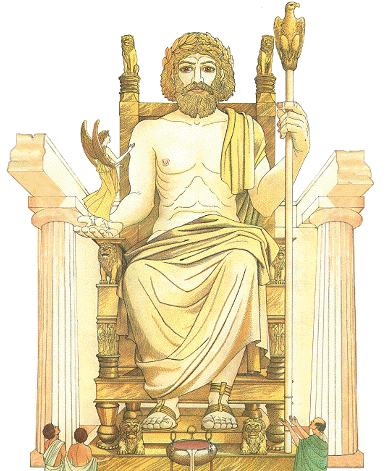
Early Greek religion abounded in gods and goddesses who personified the forces of nature. Thus Demeter (literally "Earth Mother"), was the giver of grain; Apollo, the giver of light and beauty; and Poseidon, who dwelled in the sea, was the ruler of the waters. Other deities had special functions, such as Aphrodite, the goddess of love; Dionysus, the god of wine; and Athena, the goddess of wisdom and guardian of Athens. The Greeks of Homeric times believed in gods that looked like humans, capable of malice, favoritism, and jealousy, and differing from ordinary people only in their immortality (the result of a special diet--ambrosia and nectar) and their supernatural powers. Zeus, the king of the gods, ruled the world from Mount Olympus, the tallest mountain in Greece, with the aid of eleven other deities: Hera, Athena, Ares, Aphrodite, Hephaestus, Hermes, Apollo, Dionysus, Demeter, Artemis and Poseidon.
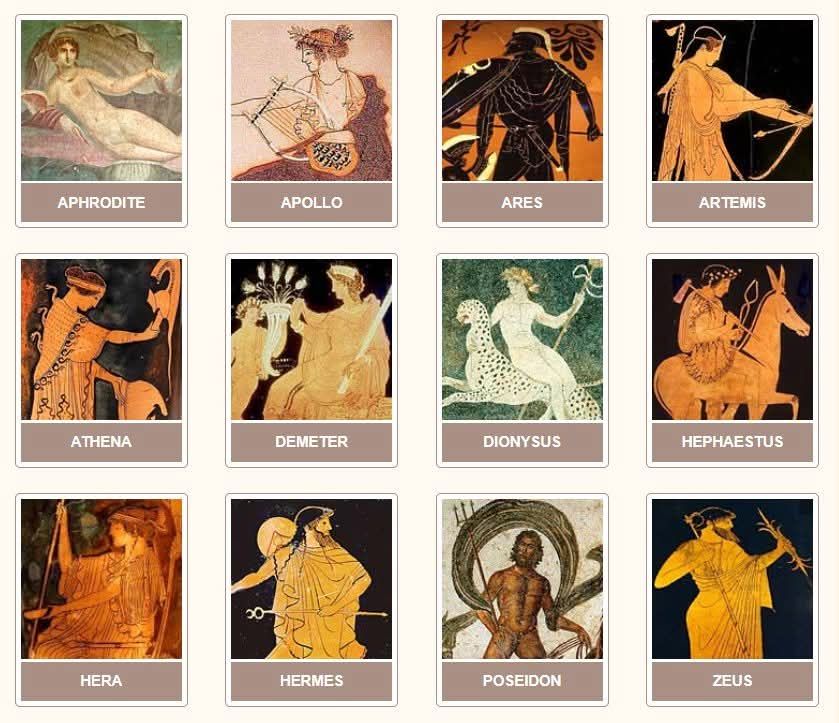
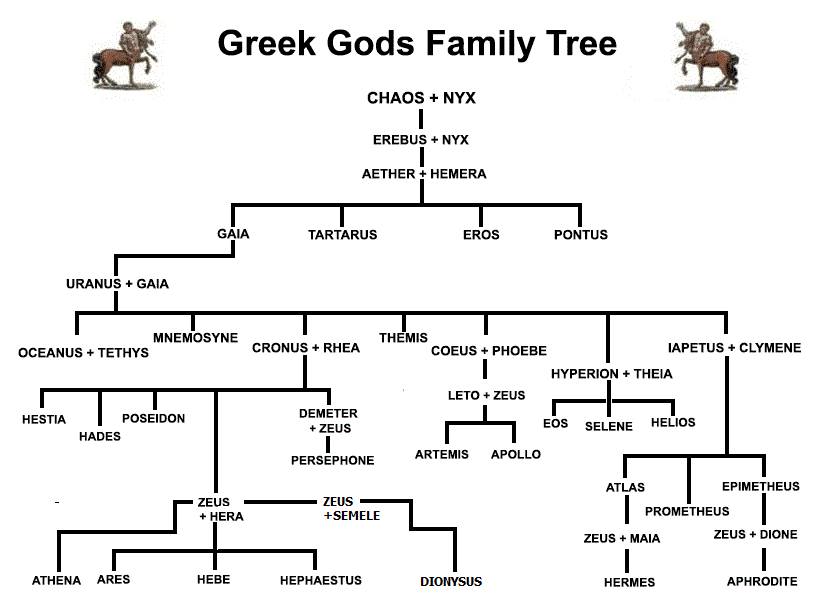
This chart shows the family tree of the Greek gods. As you can see, Zeus got around an awful lot!
It appears that originally each Greek city-state developed its own god independently, like Mesopotamia and Egypt did, and later produced a mythology that had a place for all the gods in it. Credit for writing these myths goes to Homer, the author of the Iliad and the Odyssey, and to Hesiod, whose main work, Theogeny, was a collection of more myths. Although they probably did not intend to do this, Homer and Hesiod effectively undermined people's fear of the gods by portraying them as oversized people who always behaved excessively, whether they were good or bad.(55)
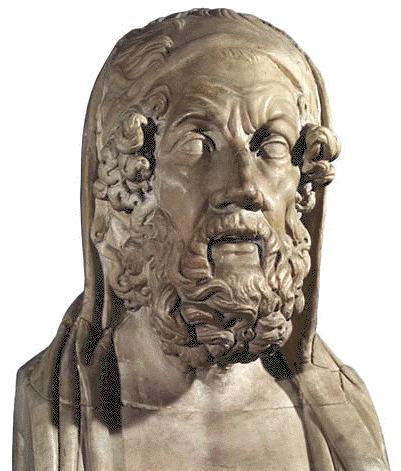
A century after Hesiod, the Orphic and Eleusinian mystery cults emerged as a new type of Greek religion. Initiates (mystae) were promised an afterlife of bliss in a paradise called Elysium, formally a reward only given to a few heroes. The basis of the Orphic cult was an old myth about how Dionysus was slain and eaten by evil giants called Titans, before Zeus arrived on the scene and burned them to ashes with his lightning bolts; then Zeus created man from the Titans' ashes. Human nature, therefore, is composed of two disparate elements: the evil titanic element (the body), and the divine Dionysian element (the soul). Death, which frees the divine soul from the evil body, is therefore to be welcomed. "Happy and blessed one!" reads a typical Orphic tomb inscription, "Thou shalt be god instead of mortal."(56) These emotional practices, which they may have imported from the Middle East, were most popular among the peasants, because they provided more color than the official ceremonies of the Greek pantheon and spiced the demanding routines of work.
The Early Philosophers
As with some other aspects of Greek culture, philosophy began in Ionia. Around 615 B.C. the Ionian city-state of Miletus had a tyrant named Thrasybulos, who ruled a prosperous community and had everything one could ask for in those days. However, he wanted something nobody else had, so he hired a fellow of Phoenician ancestry named Thales (c. 636-546 B.C.), whose job was to do nothing but sit at his court and think up ideas! This was the first philosopher, a new profession made up of people who speculated on virtually everything in nature, and discounted anything that they did not perceive through the physical senses. Such men developed the foundations for science, mathematics, and metaphysics.
Thales and a few of his immediate successors, like Pythagoras, probably took the real creative steps which opened the doors for those who followed. Because no writing from Thales survives, it is difficult to separate fact from legend on what he did. For example, he is said to have predicted the eclipse of the Sun in 585 B.C. Other stories claim that he traveled to Egypt and Babylonia (doubtful), figured the height of the Great Pyramid by measuring its shadow, proposed a central government to rule all Ionia (rejected, of course), and made a fortune in the olive oil market by buying every olive press in Miletus before harvest time, and then renting them out to the olive growers. Although he probably knew some practical techniques of angle measurement, stories that he proved geometrical theorems have no basis in fact.
We best know Thales for teaching that the Earth floats on water; all things came from water initially; and that all things are somehow made of water. Explanations for his choice of water as the main element of the universe point to its importance in the growth and nutrition of living things and its central role in daily Greek life, and perhaps because he reportedly fell into a well while stargazing! Thales is traditionally considered the teacher of Anaximander and the founder of Milesian school of natural philosophers.
The next philosophers did not think that Thales had the last word on anything, and speculated in new directions. The one thing all of them had in common was that they left no place for the gods in their theories; unlike other Greeks, they did not see the need for a hairy thunderer on Mt. Olympus to explain where the world came from. Anaximander (611-546) thought that all land animals had once been fishes in the sea, meaning that he came up with a theory of evolution 2,400 years before Charles Darwin did!(57) Anaximenes (586-525) felt that both Thales and Anaximander had been wrong, and that air, not water, was the most important element! Still another philosopher, Heraclitus (535-475), asserted that fire was the "most mobile, most transformable, most active, most life-giving" element. This search for a material substance as the first principle or cause of all things culminated two centuries after Thales in the atomic theory of Democritus (c. 460-370 B.C.) To Democritus, everything contained indivisible atoms, which differed in shape, size, position, and arrangement but not in quality. Thus the physical world became more important than the spiritual one. Meanwhile, Xenophanes (570-480) made fun of the Greek myths, and said that the gods only resemble people because people made up the stories. If horses had gods and could make statues of them, Xenophanes said, their gods would look like horses!(58)
Pythagoras of Samos (c.560-c.480 B.C.) was probably the most important of the pre-Socratic philosophers; he was responsible for important developments in mathematics, astronomy, and music. Early in life he traveled to Egypt and Babylon, and may have gotten some of his ideas there. After his return to Samos, he was expelled by the local tyrant, Polycrates, so he moved to Croton, Italy, and founded a secret brotherhood of mystics preoccupied with mathematics, the Pythagoreans. Because no reliable contemporary records survive, and because the school initially placed a death threat on any member who revealed its discoveries to the outside world, we cannot distinguish the contributions of Pythagoras from those of his followers.(59)
Pythagoreans believed in strict vegetarianism, reincarnation, and that all relations in the universe can be reduced to a set of numbers ("all things are numbers"). This generalization stemmed from certain observations in music, mathematics, and astronomy. For example, they noted that a string on a harp or lyre produces a note exactly one octave higher than a string twice as long. They also gave us the Pythagorean theorem, a highly useful tool for measuring right triangles: the square of the hypotenuse is equal to the sum of the squares of the other two sides (A2 + B2 = C2). The Egyptians and Babylonians had been practicing geometry like this for millennia, but we usually credit the Pythagoreans with the first proof of this theorem.
Pythagoras didn't stop there; he looked at a right triangle where both of the shorter sides have a length of 1, and came up with an interesting problem. Since the square of 1 is also 1, then according to his theorem the length of the hypotenuse should be the square root of two (12 + 12 = C2, with C2 equaling 2). When he tried to calculate the value of C, he got a decimal than ran on forever; he had to accept an approximate value of 1.414. Could any fraction or ratio of two whole numbers produce this? The answer he came up with was no; some numbers, like the value of pi and the square root of two, could not be correctly expressed as either whole numbers or fractions. Pythagoras had proved the existence of irrational numbers.(60)
The Sophists and Socrates
There was no university system such as we know before 400 B.C.. Teachers passed from town to town teaching classes on subjects which they claimed would lead to material success, and charged for their instruction. The most popular subject was rhetoric, the art of persuasion, or how to take either side of an argument--the sort of thing one learns today in law school. Obviously the best teachers demanded higher fees. The doctrines they taught were usually their own, and quite different from those of other teachers. These mobile teachers were known as Sophists. Sophist is derived from the Greek word Sopher, meaning wisdom.(61) Through them the ideas of the philosophers were spread to the general population.
The eroding of traditional views in the fifth century B.C. caused Greek inquiry to turn away from the physical world to consider human values and institutions. The Sophists submitted all conventional beliefs to the test of rational criticism, concluded that truth was relative, and denied the existence of universal standards to guide human actions. They loved to use ingenious words to turn around an argument, making despicable actions look excellent. Under their influence, the old admiration for knowledge became respect for a form of craftiness, the ability to advance a cause by any means possible. Today we call such a belief "situational ethics" or "ethical relativism," which some have defined as: "If you can get away with it, it's okay."
The most noteworthy of the Sophists was Protagoras, who speculated more about the gods than any philosopher before him. Protagoras did not believe that intimacy with God was possible, and concluded that "I cannot know that they exist, nor yet that they do not exist." From that he produced the idea that became the classic humanist statement, "Man is the measure of all things." This turned humanity's view of the universe upside down--man now became more important than God. This was too radical for most Athenians, and they forced Protagoras to flee because of this "impiety." However, after the Peloponnesian War ended, they no longer felt that Athens needed all the moral strength it could get, and embraced the ideas they had previously rejected. During this time Socrates would dismiss all myths as irrelevant by simply saying, "Of the gods we know nothing."
The Peloponnesian War brought all kinds of doubt to Athens: doubt about whether the war could be won, doubt about whether Athens was really more righteous than Sparta, and doubt about the mediocre leaders who followed Pericles. Appropriately, this was the time that produced the most famous doubter of all time, Socrates (c. 470-399 B.C.). We don't know much about his personal life, because he wrote nothing; all of our accounts of him come from those who knew him first-hand, especially Plato.
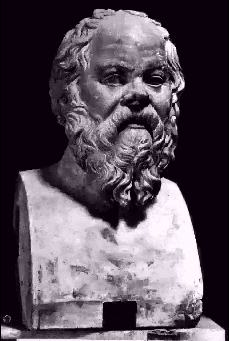
In the words of the Roman statesman Cicero, Socrates was the "first to call philosophy down from the heavens and to set her in the cities of men, bringing her into their homes and compelling her to ask questions about life and morality and things good and evil."(62) Unlike the Sophists, though, Socrates believed that by asking questions and subjecting the answers to logical analysis, agreement could be reached about ethical standards and rules of conduct. Consequently he questioned passers-by about everything; he felt his purpose in life was to be the "midwife assisting in the birth of correct ideas" (to use his own figure of speech). Taking as his motto the famous inscription on the temple of Apollo at Delphi, "Know thyself," he insisted that "The unexamined life is not worth living." To Socrates, human excellence or virtue come from knowledge, and evil and error are the result of ignorance.
Socrates invented the debating tactic we call the Socratic method; instead of answering questions directly, he would ask more questions instead, like a modern attorney, until he led others to think in strange ways and make astounding admissions. Plato wrote down a collection of these debates in his Dialogues, which probably didn't really take place, but give us a clear view of Socrates' method of reasoning. Such a discussion would have gone like this:
"He would go right up to the most prominent citizen, a great orator or anybody, and ask him if he really knew what he was talking about. A distinguished statesman, for instance, would have wound up a patriotic speech with a preroration about the glory of dying for one's country. Socrates would step up to him and say, 'Pardon my intrusion, but just what do you mean by courage?'
'Courage is sticking to your post in danger!' would be the curt reply.
'But suppose good strategy demands that you retire?' Socrates would ask.
'Oh well, then, that's different. You wouldn't stay there in that case, of course.'
'Then courage isn't either sticking to your post or retiring, is it? What would you say courage is?'
The orator would knit his brow. 'You've got me--I'm afraid I don't really know.'
'I don't either,' Socrates would say. 'But I wonder if it is anything different from just using your brains. That is, doing the reasonable thing regardless of danger.'
'That sounds more like it,' someone in the crowd would say, and Socrates would turn toward the new voice.
'Shall we agree then--tentatively, of course, for it's a difficult question--that courage is steadfast good judgment? Courage is presence of mind. And the opposite thing, in this case, would be the presence of emotion in such force that the mind is blotted out?'"(63)
Because Socrates could get anyone to contradict himself by asking enough questions, he concluded that no one really knew anything. However, because Socrates knew that he knew nothing, he reasoned that he knew more than anyone! (Are you following this?) His fame spread all over Greece, until one of his friends visited Delphi and asked the Oracle, "Is any man wiser than Socrates?" Instead of getting the usual cryptic poem, he got a one-word answer anyone could understand: "No." The celebrities he embarrassed thought him a pest, while the young people of Athens flocked to listen to him on street corners. Soon the Socratic method of questioning all cherished assumptions became a favorite tactic in political discussions among the up-and-coming generation.
In time Socrates' quest for truth led to his undoing, for the Athenians, unnerved by their defeat in the Peloponnesian War, arrested him and put him on trial for his life. They really wanted to charge him with inventing the philosophy which produced Critias and Alcibiades, but because the amnesty following the expulsion of "the thirty tyrants" prevented this, they instead accused him of introducing strange gods and corrupting the youth (As if he could do any worse than the Sophists had already done!). Instead of saving himself by recanting, Socrates defended himself with a speech the judges thought was arrogant:
"Athenians, I am not going to argue for my own sake . . . but for yours, that you might not sin against God by condemning me, who am his gift to you. For if you kill me you will not easily find a successor to me, who, if I may use such a ludicrous figure of speech, am a sort of gadfly, given to the state by God; and the state is a great and noble steed who is tardy in his motions owing to his very size, and requires to be stirred into life. I am that gadfly which God has attached to the state, and all day long and in all places am always fastening upon you, arousing and persuading and reproaching you. You will not easily find another like me, and therefore I would advise you to spare me."(64)
Then Socrates proposed an alternate sentence: a pension and free meals for life, as payment for his past military service (see footnote #61). Instead, by a vote of 280-220, a jury of citizens condemned Socrates to die. He had a chance to run away, but instead he accepted the sentence and calmly drank the hemlock, talking with his friends until the poison took effect. Socrates said he did this to avoid giving future philosophers a bad name, while Xenophon tells us that he was looking forward to escaping the pains of old age, which may explain why he gave a weak defense during the trial.
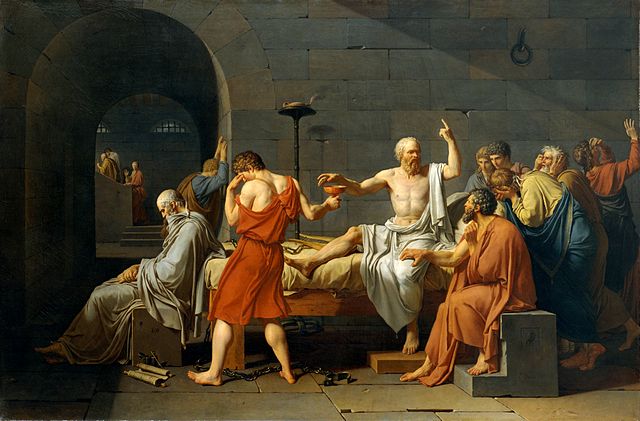
The death of Socrates.
Plato and Aristotle
The most famous student of Socrates was Plato (427-347 B.C.). At first Plato wanted a career in politics, but the Athenians wouldn't elect him to anything, because he was a cousin of Critias and because of his connection to Socrates. Thus, he became a writer and teacher instead. Just outside Athens he founded the Academy, the famous school that existed from about 388 B.C. until 529 A.D., when the Christian emperor Justinian closed it. Here he taught and encouraged his students, whom he expected to become the intellectual elite who would go forth and reform society.
Like Socrates, Plato believed that truth exists, but only in the realm of thought, the spiritual world of Ideas or Forms. Such universals as Beauty, Good, and Justice exist apart from the material world, and the beauty, good, and justice encountered in the world of the senses are only imperfect reflections of eternal and changeless ideas. The task for humans is to come to know the True Reality--the eternal Ideas--behind these imperfect reflections. Only the soul and the "soul's pilot"--reason--can accomplish this, for the human soul is spiritual and immortal, and in its prenatal state it existed "beyond the heavens" where "true Being dwells."(65)
Disillusioned with the democracy that led Athens to ruin in the Peloponnesian War and condemned Socrates to death, Plato expounded his concept of an ideal state in The Republic, the first major book on political science. The state's basic function, founded on the Idea of Justice, was the satisfaction of the common good. Plato imagined the perfect state as a "spiritualized Sparta," where the state regulated every aspect of life, including thought. Thus those poets and forms of music considered unworthy were banished from the state. Private property was abolished because it bred selfishness. Plato believed there was no essential difference between men and women; therefore, women received the same education and held the same occupations as men, including "the art of war, which they must practice like men."(66) Individuals belonged to one of three classes and found happiness only through their contribution to the community: workers by producing the necessities of life, warriors by guarding the state, and philosophers by ruling in the best interests of all the people.
Plato's greatest pupil was Aristotle (384-322 B.C.). Reacting against the otherworldly tendencies of Plato's thought, Aristotle insisted that Ideas have no separate existence apart from the material world; knowledge of universal ideas is the result of the painstaking collection and organization of particular facts. Because he disagreed with Plato on these key points, Aristotle was not allowed to become headmaster of the Academy after Plato's death. Accordingly, he moved to Macedonia in 343 B.C., where King Philip hired him as a personal tutor for his son, Alexander the Great.(67) Eight years later he returned to Athens and founded his own school, the Lyceum. As one might expect from Aristotle's approach to research, the Lyceum became a center for the analysis of data from many branches of learning. He had a habit of delivering his lectures while walking, so his disciples received the name of Peripatetics, or walking philosophers.
To us today, Aristotle's most significant treatises are the Ethics and the Politics. They deal with what he called the "philosophy of human affairs," whose object is the acquisition and maintenance of human happiness. Two kinds of virtue, intellectual and moral, are described in the Ethics. Intellectual virtue is the product of reason, and only people like philosophers and scientists ever attain it. Much more important for the good of society is moral virtue. Virtues of character, such as justice, bravery, and temperance--are produced not by reason but by habit and thus can be acquired by all. In this connection Aristotle introduced his Doctrine of the Mean as a guide for good conduct. He considered all moral virtues to be means between extremes; courage, for example, is the mean between cowardice and rashness.
In the Politics Aristotle viewed the state as necessary "for the sake of the good life," because its laws and educational system provide the most effective training needed for the attainment of moral virtue and hence happiness. Thus to Aristotle, the popular viewpoint that the state stands against the individual would be unthinkable.
Aristotle's writings on formal logic, collectively known as the Organon ("Instrument"), describe two ways in which new truths can be found. The first, induction, moves from particular facts to general truths. Deductive logic, on the other hand, moves from the general to the particular. To simplify deductive reasoning from general truths, Aristotle devised the syllogism, a logical structure requiring a trio of propositions. The first two propositions (the major and minor premises) must be plainly valid and logically related so that the third proposition, the conclusion, inevitably follows. For example, (1) all Greeks are human; (2) Socrates is a Greek; (3) therefore Socrates is human.
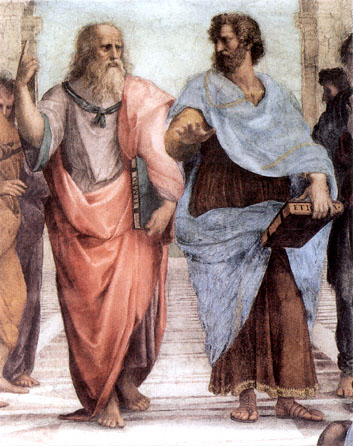
Few thinkers had interests as widespread as Aristotle's. He investigated such diverse fields as biology, mathematics, astronomy, physics, literary criticism, rhetoric, logic, politics, ethics, and metaphysics. His knowledge was so encyclopedic that there is hardly a college course today that does not take note of what Aristotle had to say on the subject; even so, we estimate that only one fourth of his writings have survived to our time. Although his works on natural science are grossly inaccurate by our standards, and little more than historical curiosities to us, they held a place of undisputed authority until the scientific revolution of the sixteenth and seventeenth centuries.(68)
Other Developments in Greek Philosophy
Developments in philosophy after Aristotle reflected the changed environment of the Hellenistic Age. With the loss of political freedom and the prevalence of internal disorder, philosophers concerned themselves less with the reform of society and more with the attainment of happiness for the individual. "There is no point in saving the Greeks," was how one Hellenistic philosopher summed up the situation, a sharp contrast to what Socrates, Plato, and Aristotle said. This emphasis on peace of mind for a person living in an insecure world led to the rise of four new schools of Hellenistic philosophy, all of which had their start at Athens: the Skeptics, Cynics, Stoics and Epicureans.
The Skeptics and Cynics reflected most clearly the doubts and misgivings of the times. Skeptics avoided anxiety by denying the possibility of finding truth. The wise, they argued, will suspend judgment and not dogmatize because they have learned that sensory experience, the only source of knowledge, is deceptive. The Skeptics were like modern pragmatists in substituting probability for certainty and insisting that even the probable must be tested by experience and exposed to the possibility of contradiction. To drive the point home they were famous for arguing both sides of the same question.
The Cynics carried negativism further; they believed in shunning the values and conventions of society. Their founder was a student of Socrates named Antisthenes (455-365 B.C.). Antisthenes, like Socrates, taught that happiness depends solely on one's own moral virtue, and that virtue is the highest value in life. However, whereas Socrates advocated temperance and self-control, Antisthenes urged harsh and ascetic self-denial. His followers behaved like Hindu mystics; they grew their hair long, lived under trees or bridges, and owned almost nothing. People gave them the name "cynic" (doglike) because of their vicious attacks on the lifestyle of the rich.
The most famous Cynic was Diogenes of Sinope, who reportedly lived in a large tub, and went about Athens with a lantern in the daytime, claiming to be looking for an honest man--but never finding one. To those who looked down on his behavior, he shouted back, "Look at me, I am without house or city, property or slave. I sleep on the ground. I have no wife, no children. What do I lack? Am I not without distress or fear? Am I not free?"(69) In one celebrated episode, Alexander the Great met Diogenes, and was so impressed by his determination that he said, "If I were not Alexander, I would wish to be Diogenes."
More practical and popular were Stoicism and Epicureanism. Stoicism's founder, Zeno (336?-261?), spent the early part of his life in the vocation of his father, a merchant, but one day a fortunate shipwreck made him lose his goods during a voyage to Athens, and he turned to philosophy for consolation. Though he had previously known something about the doctrines of Socrates, he first became a disciple of the Cynics, and then studied Platonism. After twenty years of preparation, he opened a school in the stoa or porch in Athens, from which his doctrine and disciples have received their name. He presided over this school for many years, until he chanced to fall and break his finger; he took this as a sign that his time was up, and strangled himself.
Zeno did not indulge in any fantasies on what kind of society his ideas might produce. His only interest was morality; making men virtuous was his aim. To do this, he taught the two great Stoical maxims: "Live according to Reason" and "Live in harmony with Nature." Because reason controls nature, it ought to control man. Our existence should be intellectual, and all bodily pains and pleasures should be despised. Humans become good by cultivating a reasonable outlook and not giving way to emotion. A Stoic does not regret happenings that are outside his control, but concentrates his efforts on what he can control--his attitude and response to what happens. The human soul is simple and solely rational. The expression "he took it philosophically" reflects the idea that the Stoic sage is the typical philosopher.
Stoicism flourished during the Roman era, because it emphasized civic duty, social responsibility, the importance of good law, and the basic rights of all human beings; Roman citizens valued most of these things already. Important Roman Stoics included Epictetus, a slave who became a leading philosopher; Emperor Marcus Aurelius; and Seneca, the tragedian, author and prime minister to Nero; Cicero and the Apostle Paul were also influenced to some degree. For a thousand years after the fall of Rome, Stoicism continued to find admirers; even John Calvin may have taken some ideas from it ("the Protestant work ethic").
A diametrically opposite view was taken by Epicurus (341-270). Epicurus studied with followers of Plato and Democritus before opening his school in Athens. The school, later called the Garden, accepted women and slaves; that and the Epicurean philosophy led to public criticism of the school as a haven of debauchery. In reality, life at the school was fairly austere. Most of the writings of Epicurus have been lost, save some fragments from his most important work, Peri Physeos (On Nature), which were recovered from charred papyri buried at Herculaneum.
Epicurus taught that happiness could be achieved simply by freeing the body from pain and the mind from fear, especially the fear of death. To do this, people must avoid bodily excesses, including sensual pleasures, and accept the scientific teaching of Democritus that both body and soul are composed of atoms that fall apart at death. Thus, there is nothing immortal or incorporeal about us; beyond death is no existence and nothing to fear.
In ethics, the main thesis of Epicureanism is that the senses are the best guidance of our actions. Consequently, seeking pleasure and avoiding pain are the supreme good and the principal goals of life. People should therefore forget their fears of gods and of punishment after death (both of which have no logical basis) and live for pleasure. As for the gods, if they exist, they do not concern themselves with humans but spend their time pursuing true pleasure like good Epicureans. Nowadays we summarize this attitude with the saying "If it feels good, do it." This has become the predominant philosophy of Western civilization today, whether or not today's practitioners know it.
It appears that nations are founded by individuals of a hardworking, Stoic bent, and when they become successful, the Epicurean philosophy gradually takes over. This is definitely the case with the United States; the pioneers and homesteaders had a different set of values from most of today's "Baby Boomers" and "Generation X-ers." Historians disagree on when such a transition from Stoicism to Epicureanism took place; this author marks the beginning of it in the 1920s, when actors, musicians, and professional athletes--in short, entertainers--became the most highly esteemed people in America. The transition went on for a generation, finally finishing in the 1950s, when the self-sacrificing values which got our parents and grandparents through the Great Depression and World War II were no longer seen as necessary. Since then, moralists have feared that America has become too fat and happy for its own good, and will decline and fall as surely as Rome did, unless we return to the morality of a less decadent era. We saw the clash between the old and new values in the 1992 and 1996 elections, when World War II veterans ran against the first Baby Boomer president, Bill Clinton.
This is the End of Chapter 2.

FOOTNOTES

54. Herodotus, VII, 10.
55. Homer gave us a good example of this behavior in Book 5 of the Iliad. He portrayed Ares, the god of war, as a bully, rather than a true hero. When Ares got involved in the war on the side of the Trojans, he had his way at first, terrifying everyone on the battlefield, until he met the bravest of the Greeks, Diomedes. Then Athena, who favored the Greeks, showed up, too, and she told Diomedes not to be afraid; if he threw his spear at Ares, Athena would make sure he did not miss. Diomedes threw it, giving Ares a minor wound; Ares went crying to Mt. Olympus, and didn't show his face again!
Nobody knows for sure when Homer lived; most historians put him in the ninth century B.C. and accept the traditional dates of 1184-1174 B.C. for the Trojan War he told about in the Iliad. The author believes that the Trojan War also took place in the ninth century B.C.; this would go a long way toward explaing the similarities between Homer's Achaeans and the classical Greeks. This would also make Homer an eyewitness of the war, or a witness at least, since everybody claims he was blind.
56. This myth about Dionysus reminds us of the Egyptian story about the death and resurrection of Osiris. In fact, when Greeks starting visiting Egypt, they figured that Osiris and Dionysus were two names for the same god. Respectable Greeks, however, were ashamed of Dionysus for a long time, and wouldn't mention his name if they could help it. This is because Dionysus was also the god of parties, and his worshipers got drunk at orgies, leading to unspeakable acts.
57. "There is nothing new under the sun . . ."--Ecclesiastes 1:9.
58. We give this idea the long name of anthropomorphism. It means that man will tend to invent gods which fit his own view of the universe. To give some examples: the Greeks were intellectuals, and so were their gods; the Norse gods were as warlike as the Vikings who worshiped them; the Chinese had a bureaucratic government for more than 2,000 years, so they imagined Heaven full of bureaucrats, rather than angels!
59. According to Herodotus (Book IV: 94-95), Pythagoras had a Thracian slave named Salmoxis. Salmoxis eventually bought his freedom and earned himself a fortune, before returning to Thrace. He taught the philosophy he learned from the Greeks by inviting the Thracians to banquets, where he talked about his beliefs while the guests feasted. Most of all he taught his students that they would not really die, but go with him to a blessed paradise. To prove this doctrine he faked his own death, and hid in a mausoleum for three years; his emergence in the fourth year convinced many that his teachings were true. Thus, Salmoxis had followers as late as the first century A.D.; when the Romans conquered nearby Dacia they ran into a group of fearless warriors who worshiped a god named Zamolxe (Salmoxis) and believed they were immortal.
60. He thought this was such a great discovery that he sacrificed a hundred bulls to thank the gods. Now that's irrational!
61. Likewise, "philosopher" meant "lover of wisdom." Today we often think of philosophers as wimpy little intellectuals, but this is not entirely correct. Socrates came from a family of stonecutters, and was a veteran of the first battles in the Peloponnesian War; at Potidaea he showed off by going barefoot when his unit marched across some ice. And Plato's name is really a nickname; it comes from platon, meaning broad-shouldered, because he was once a wrestler. Remember the Greek ideal--physical and mental development are equally important--so they might have expected their philosophers to look more like Hulk Hogan than Woody Allen!
62. M. Cary and T. J. Haarhoff, Life and Thought in the Greek and Roman World, 5th ed. (London: Methuen & Co., 1959), p. 200.
63. Max Eastman, Secrets of the Past, New York, Berkley Books, 1980, pg. 171-172.
64. Plato, Apology, 56.
65. Plato, Phaedrus, 247.
66. Plato, The Republic, 451.
67. Aristotle kept in correspondence with Alexander after his student went off to conquer the world. Alexander sent him back plants, animals, and other interesting scientific specimens, and when he got to Egypt, Aristotle encouraged him to find out what causes the Nile to flood every summer. Instead of sailing upstream, Alexander wrote that the annual flood was caused by rain; this pleased the old philosopher very much.
68. "The more one peruses this author, the more one realizes the wide range, the almost universal scope of his misinformation. I cannot help thinking this is why his pupil, Alexander the Great, was so simple in some respects."--Will Cuppy
69. The Cambridge Ancient History (1936 edition), vol. 11, p. 696.
Support this site!

PAGE NAVIGATOR
A History of Europe
|
Other History Papers |
Beyond History
|
